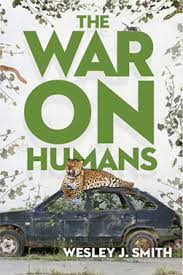 Culture & Ethics
Culture & Ethics
The Green War on Africans
 In my e-book, The War on Humans, I argue that the mainstream of the environmental movement has become anti-human — both in its advocacy (people are cancer, etc.) and its policy goals and desired outcomes.
In my e-book, The War on Humans, I argue that the mainstream of the environmental movement has become anti-human — both in its advocacy (people are cancer, etc.) and its policy goals and desired outcomes.
The throttling of African development is a cruel example I commonly give, focusing on how the green anti-humans want to prevent Africa from fully electrifying until it can be done with renewable methods. But that will take decades, during which time Africans will continue to suffer from bone-crunching destitution.
Indeed, when I did the Thom Hartmann Show, he said we should focus primarily on using solar panels to electrify the continent. He also said he believes the Earth is a sentient being. Ridiculous! That kind of irrationality hurts African people in the name of "saving the Earth."
Africans need electricity now, not in 2050. Lives are at stake, as a liberal activist named Caleb S. Rossiter eloquently describes in the Wall Street Journal. From "Sacrificing Africa for Climate Change":
I oppose my allies’ well-meaning campaign for "climate justice." More than 230 organizations, including Africa Action and Oxfam, want industrialized countries to pay "reparations" to African governments for droughts, rising sea levels and other alleged results of what Ugandan strongman Yoweri Museveni calls "climate aggression."
And I oppose the campaign even more for trying to deny to Africans the reliable electricity — and thus the economic development and extended years of life — that fossil fuels can bring.
Being "well meaning" and working to deny Africans "reliable electricity" is a contradiction in terms.
Because Rossiter isn’t caught up in the human-sacrificing cult of green, he wants to let Africa industrialize. Completely:
As an Africanist, rather than a statistician, I object most strongly to "climate justice." Where is the justice for Africans when universities divest from energy companies and thus weaken their ability to explore for resources in Africa? Where is the justice when the U.S. discourages World Bank funding for electricity-generation projects in Africa that involve fossil fuels, and when the European Union places a "global warming" tax on cargo flights importing perishable African goods?
Even if the wildest claims about the current impact of fossil fuels on the environment and the models predicting the future impact all prove true and accurate, Africa should be exempted from global restraints as it seeks to modernize.
Why? Because human lives are at stake! Because we should not sit on people’s aspirations to live better lives:
Bringing more-reliable electricity to more Africans would power the cleaning of water in villages, where much of the population still lives, and replace wood and dung fires as the source of heat and lighting in shacks and huts, removing major sources of disease and death. In the cities, reliable electricity would encourage businesses to invest and reinvest rather than send their profits abroad. But the green anti-humans would rather take the wealth of the West and give it to the destitute as "reparations." That would make us poorer. Much would be lost in corruption. And in a terrible way it would generate an unhealthy culture of dependency in Africa, while doing little to alleviate the continent’s general misery.
Ideologues protest so-called warmongers at the drop of a hat. Yet the global warming hysterics promote continued misery and suffering on the continent and most of the ideological extremists applaud.
That’s why it’s called a war on humans. Good on Rossiter for busting the hypocrisy. Put people first.
